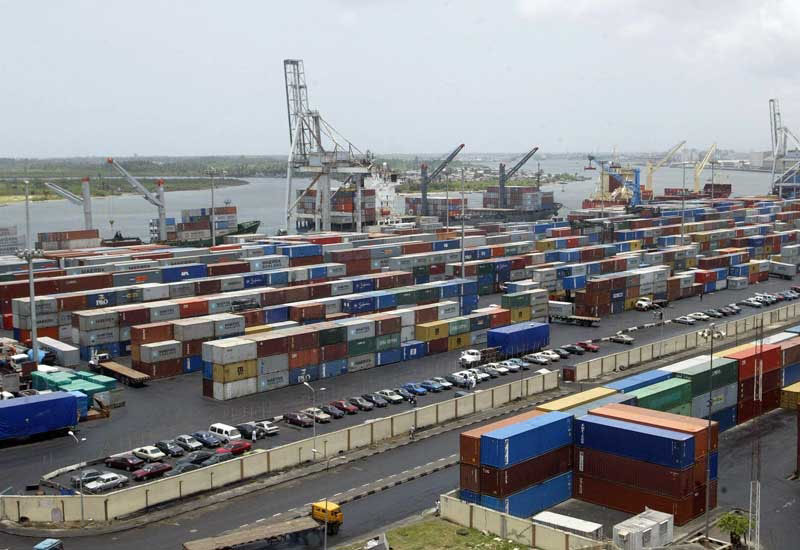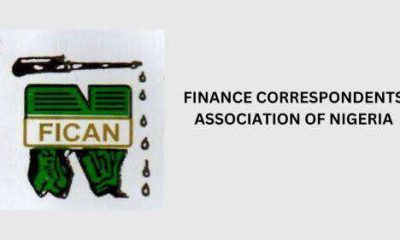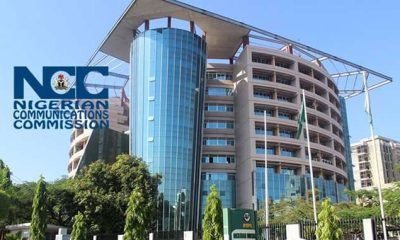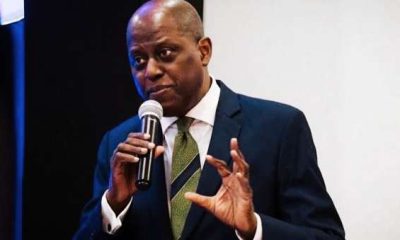Business
CBN E-invoice policy worsens Nigeria’s trade problems, as stakeholders ground ports

By ADEBAYO OBAJEMU
Ports operations at both Tin-Can Island and the Ports & Terminal Multipurpose Limited have come to temporary halt, following the beginning of the withdrawal of services by Customs agents and freight forwarders operating at the two ports. What is more, the agents have also said they would extend the industrial action to all the ports in Lagos State, including Apapa, and Kirikiri Lighter Terminal, if their requests are not attended to by the appropriate authorities.
Recall that the Central Bank of Nigeria had in a circular to all authorised dealers and the general public made known the introduction of e-invoicing for all imports and exports in the country, effective February 1, 2022.
In a swift reaction to the development, freight forwarders operating at both the Tin-Can Island and PTML last week gave the authority a 72- hour ultimatum to address the technical glitches facing the newly introduced e-valuation system or face industrial action. In fulfilment of their threat, the aggrieved freight forwarders last Monday began the withdrawal of their services till further notice.
Speaking to the media on what spurred their current action, the Assistant Secretary, PTML Chapter of the Association of Nigerian Licensed Customs Agents, Sunny Ugorji, said the agents were not against the platform but the implementation process. Ugorji, stated that the execution of the policy showed the officers of the Nigerian Customs Service had increased the duties on imported cars without the notice of the agents.
He said, “We only withdrew our services because of the e-valuation, there is no work; we have withdrawn our services until they correct the e-valuation system. We are not against e-valuation, what we are against is the implementation of the platform. The implementation is indicating that the Nigeria Customs Service has increased duties without informing us. I don’t see what they say about e-valuation; it simply means we are going to observe port operations with no much interface which is good.”
“For instance, a vehicle of 2011 that used to be cleared around N600,000 now costs about N3m. So, we don’t know where to start and we want the people to know that the Customs are pushing us out of work. That is why most people here are withdrawing their services until the Customs look into it and address the issue of illegal notice.”
The e-invoicing that led to a sharp rise in the costs of clearing goods has also forced Lagos car dealers to join protesting clearing agents. Urgoji further added that, “We have succeeded in withdrawing our services both at the PTML Command and Tin-Can. By tomorrow (Tuesday) we are going to Apapa. On Wednesday, we are going to KLT to make sure we all speak with one voice.”
Corroborating Ugorji, the Chairman of the National Association of Government Approved Freight Forwarders, PTML Chapter, George Okafor, while talking to journalists stated that, “We just withdrew our services; all the agents have withdrawn their services at PTML.
“Our attention was only at PTML but it has now extended to Tin-Can. We are on it until the government speaks to us. We gave the Customs Controller-General 72 hours to talk to us but until now, he hasn’t done that. So we are withdrawing our services until the Customs talk to us.”
The Public Relations Officer, PTML Command, NCS, Muhammad Yakubu, told the media that indeed, the agents have withdrawn their services, adding that the command was only enforcing the e-valuation policy of the government.
He said, “They have been on strike since we came to the office. I keep on telling them that this thing is beyond us (Customs), it is a Federal Government policy and we are just here to implement the policy. They should talk to the Federal Government.
Stakeholders’ React
Meanwhile, stakeholders and analysts have condemned the policy saying it would worsen international trade transaction system.
According to Dr. Olufemi Omoyele, director of Entrepreneurship at Redeemers University, the e-invoicing policy at this period “will worsen Nigeria’s fragile international trade transactions process, up transaction costs, and institutes regime of red tape, fuel uncertainty, and escalate business disruption, and in the process weaken investors’ confidence.
Dr. Muda Yusuf, CEO of the Centre for the Promotion of Private Enterprise and former Director General of the LCCI agrees with the position of Omoyele, and in addition, he said the e-invoicing will lead to corruption. He warned that there is no compelling justification for their introduction in the first place and urged the CBN to collaborate with the Nigeria Customs to address any gaps in the valuation processes.
Dr. Lawal stated that last October, Director General of the World Trade Organization, Dr. Ngozi Okonjo-Iweala expressed worry over the high trade cost in Nigeria, which she said was an equivalent of 306% tariff, which is above the African average.
“Her assertion summarizes the harrowing experience of Nigerian investors in the international trade process.
“There are issues of overlapping regulation, excessive documentation, weak application of technology, physical examination of cargo, extortion, inadequate cargo handling equipment, stifling bureaucracy, difficult transportation logistics, challenges of access to the ports and weak dispute resolution system. We should therefore be seeking to alleviate the pains of investors in the economy, not exacerbate to it,” she warned.
Centre for the Promotion of Private Enterprise further stated that the increasing role of the CBN into the trade policy space is an anomaly in Nigeria’s economic management system and a serious cause for concern to the business community, citing issues of import valuation and classification that are statutory functions of the Nigeria Customs Service, with the Finance Ministry as the supervising organ.
The Centre warned that as CBN now undertakes valuation and product price benchmarking of imports and exports it will lead to an additional regulatory compliance burden and costs for the business community.
On the matter, the House of Representatives had earlier called for Godwin Emefiele’s resignation.
There was a clash between members of the House of Representatives Joint Committees on Customs & Excise, and Banking and Currency, last Tuesday over a decision to issue a warrant of arrest for Emefiele, the Governor of the Central Bank of Nigeria.
The warrant was issued on Emefiele after the Chairman of the House Committee on Customs and Excise, Leke Abejide, decided that he had refused to answer the lawmakers’ summons. On January 27, 2022, the House of Representatives requested that the CBN halt the electronic evaluation and invoicing policy that had just been implemented in the import and export chain, warning that it could have a negative impact on revenue collection by the Nigeria Customs Service.
Emefiele was billed to testify before the committee on the policy’s impact on Customs’ revenue objective for 2022. Following the failure of a call for the CBN Governor’s appearance, several lawmakers said that the CBN Governor had always refused invitations from the National Assembly and that he was being shielded by some unknown lawmakers.
Abejide, who moved the motion, recalled that the CBN published a circular on imports and exports business rules in Nigeria on January 21, 2022, with Reference Number TED/FEM/FPC/PUB/01/001, which was to take effect 10 days later, on February 1, 2022. The lawmaker had said, “Sudden monetary/fiscal circular hurriedly or haphazard implemented often leads to policy summersault, hence major policy change such as this, a grace period of 90 days is usually expected for transactions to run their full course to avoid distortion in the economy and price distortions of trade.”
Adopting the motion, the House had urged the CBN to “suspend the policy with immediate effect to enable adequate sensitization on the workability of the policy in all major ports of entry including seaports, airports and border stations.”
The lawmakers also invited the Governor of the Central Bank of Nigeria to brief the Committee on Customs and Excise, with the assurance that the target revenue of N3.1tn given to the Nigeria Customs Service by the Federal Government of Nigeria, which the NCS announced to the media that they are targeting N4.2tn, will not be distorted by this sudden policy implementation.
Squabble in the Chamber
Presenting the matter once again, Abejide expressed his displeasure with Emefiele’s absence at the investigation hearing on Tuesday, saying that the parliament could not continue to tolerate it and that a warrant of arrest should be issued.
Recall that it was reported last month that The Central Bank of Nigeria (CBN) announced the introduction of e-evaluator and e-Invoice to replace hard copy final invoices as part of the documentation required for all import and export transactions, the new regulations orders that imports and exports with unit prices that are more than 2.5% of the verified global checkmate prices would be queried and will not be allowed for successful completion of either Form M or Form NXP.
The CBN ordered that no importer/exporter may make a payment to a foreign supplier’s credit unless the electronic invoice has been authenticated by Authorised Dealer Banks and the required payment documentation have been supplied.
According to the operational handbook for Form M and Form NXP e-Invoicing, a supplier/buyer of goods or services for import/export activities into or out of Nigeria must register on a specific electronic portal provided by CBN and administered by CBN’s agent service providers.









